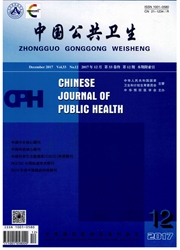

 中文摘要:
中文摘要:
目的了解碘充足地区孕妇碘营养状况及新生儿甲状腺功能。方法选择天津市中心妇产科医院的174名妊娠晚期孕妇为调查对象,收集其空腹晨尿及新生儿脐带血,分别测定尿碘浓度及血清中游离三碘甲腺原氨酸(FT3)、游离甲状腺素(FT4)、敏感促甲状腺激素(sTSH)水平。结果 174名孕妇尿碘中位数为217.06μg/L9,.2%孕妇碘过量2,7.6%碘缺乏;新生儿FT3、FT4s、TSH水平为(2.31±0.28)(、16.50±1.34)pmol/L、4.71(3.96~6.04)μU/mL;整体孕妇尿碘水平与新生儿FT3、FT4s、TSH水平无相关性(P〉0.05),不同碘营养状况孕妇所产新生儿FT3、FT4水平在各组间差异无统计学意义(P〈0.05),碘不足组孕妇所产新生儿的sTSH水平高于碘超足量组;男婴的sTSH水平高于女婴,且男婴的sTSH更偏向于高值分布,经阴道产的新生儿sTSH水平高于剖宫产。结论碘充足地区孕妇整体碘水平适宜,但仍存在碘缺乏和碘过量个体,碘缺乏孕妇所产新生儿患甲减、亚甲减的风险较高;性别和生产方式影响新生儿的sTSH水平。
 英文摘要:
英文摘要:
Objective To examine the iodine status of pregnant women and thyroid function of neonate in an iodine-sufficient area.Methods Totally 174 pregnant women in the third trimester of pregnancy were chosen from Tianjin Central Gynecological and Obstetrical Hospital.Then the limosis morning-urine of pregnant women and neonates cord blood were collected.The urinary iodine level was determined with arsenic-cerium catalytic contact.The levels of free triiodothyronine(FT3),free thyroxine(FT4),and sensitive thyroid-stimulating hormone(sTSH) in serum were measured with chemiluminescence.Results The median of urinary iodine of the women was 217.06 μg/L.Most of the women(63.2%) were adequate for iodine nutrition,but some of them were in the status of iodine deficiency(27.6%) and iodine excess(9.2%).The average level of FT3,FT4 and sTSH was 2.31±0.28 pmol/L,16.50±1.35 pmol/L,and 4.71(3.96-6.04) μU/mL,respectively.There was no correlation between urinary iodine and FT3 among the women and FT4 and sTSH levels among the neonate(P0.05).No statistic significance was found in neonates' FT3 and FT4 level with their mothers in different iodine nutrition status.The sTSH level of the neonates with the mothers in iodine-sufficient status was higher than that with the mothers in iodine more than adequate requirement status.The level of sTSH of baby boys was higher than that of baby girls,and baby boys' sTSH tended to distribute with higher values.The sTSH level of neonates produced by transvaginal was higher than that of produced by cesarean section.Conclusion The iodine status of the most pregnant women in iodine-sufficient area was adequate,but there were still some iodine deficiency and iodine excess individuals.Neonates with mothers of insufficient iodine nutrition were more likely to have hypothyroidism and subclinical hypothyroidism.Gender and way of parturition may affect the level of sTSH in neonates.
 同期刊论文项目
同期刊论文项目
 同项目期刊论文
同项目期刊论文
 Exploration of the safe upper level of iodine intake in euthyroid Chinese adults: a randomized doubl
Exploration of the safe upper level of iodine intake in euthyroid Chinese adults: a randomized doubl 期刊信息
期刊信息
